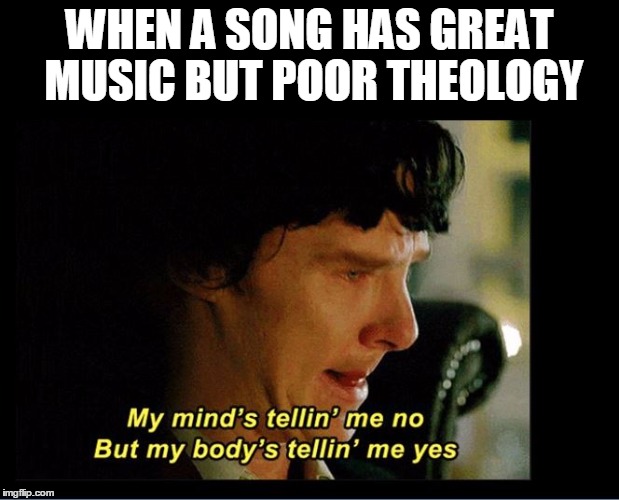Stop Making Worship About Self Expression
I’m about to write something very provocative to western church culture; but here goes. Worship is not about self expression. There. That statement alone is enough to make some worshipers, church musicians, and worship leaders stop reading. I hope you’ll continue.
When I was in music school, one of the first things we learned was that music is all about self expression. One of the national standards for music education involves improvisation. The standard says that students should learn to find the music inside themselves and how to channel it. It’s not unusual for musicians to use phrases like “look within.”

The idea of finding the music within is not too far off from the other introspective catchphrase of “follow your heart.” As a child of the 1990’s it seemed like every other movie produced in that decade involved the lead character looking within and finding strength. Adjacent to the follow your heart theme was the “be true to yourself” mantra. However you want to phrase it, the 90’s was a decade of looking within.
Over the last fifty years the church has embraced the zeitgeist of authentic self expression and realigned its worship accordingly, to the point that it’s narcissistic. Most modern worship songs speak subjectively of the writer’s feelings about God rather than of God himself. Popular worship songs lyrics reveal a strong leaning toward the postmodern, where the interpreted meaning can change from worshiper to worshiper. In short, self-expressive worship is an embrasure of secularization. While Western Christians are great at worshiping in Spirit, we’ve forgotten how to worship in Truth.
1. Worship is Primarily Obedience
Worship is an act of obedience much more than it is self expression. In fact, throughout the Old Testament, God responded in righteous anger whenever his creature dared to take worship into its own hands.
In 1 Samuel 13, Saul became impatient waiting for the prophet to arrive and made the prescribed sacrificial offering himself. When Samuel arrived, he announced that God had rejected Saul’s worship, regardless of the motive.
Samuel said to Saul,
“You have done foolishly. You have not kept the command of the LORD your God, with which he commanded you. For then the LORD would have established your kingdom over Israel forever. But now your kingdom shall not continue. The LORD has sough out a man after his own heart, and the LORD has commanded him to be prince over his people, because you have not kept what the LORD commanded you.
1 Samuel 13:13-14
Only a few chapters later, after a similar incident, Samuel declared to Saul “Does the LORD delight in burnt offerings and sacrifices as much as in obeying the LORD? To obey is better than sacrifice, and to heed is better than the fat of rams.”
Saul wasn’t the first to worship in his own way. Cain ignored God’s requirements and offered a sacrifice of his own choosing. We normally spend so much time rightly focused on Cain’s heart condition that we give little attention to the fact that Cain objectively disobeyed God’s requirements for worship. His sacrifice was lacking not only in faith, but in substance. Abel’s offering had both.
God requires the right motive as well as the right mode of worship. While the Church is in no way held to the ceremonial law, which became embodied in the person of Christ, obedience still remains the central tenet of authentic worship in the New Testament and in the age of the Church.
2. Regulative Principle
The overwhelming consensus throughout church history is that God prescribes not only the Who of worship, but also the how. He is the creator, and as the author he alone has authority to require worship in the mode of his choosing. While he has fulfilled certain acts of worship with the coming of the New Covenant, (animal sacrifice for one example) the principle remains constant that God gives specific instructions in how he is to be approached.
In the New Testament, we find that certain acts are commanded for corporate worship. For instance the gathered church is commanded to read the Word aloud. Scripture is to be preached in the assembly and authoritatively declared. The body is to pray together and sing “Psalms, hymns, and spiritual songs.” The ordinances of baptism and the Lord’s supper are to be observed. Additionally, there is scriptural warrant for public fasts, vows, and thanksgivings.
The biblical principle is that only what is commanded or implied in Scripture is appropriate for corporate Christian worship. God does not accept anything that falls outside of his command, regardless of its well meaning intent.
A couple examples may be in order.
Perhaps I would like to bring a Christian comedian to my church and allow him to put on a show. Is this worship? According to scripture, the clear answer is no. That does not mean that a church could not schedule a special event, retreat, festival, concert, etc. But since a dedicated time of comedy is not commanded or implied in Scripture for corporate worship, it should not take place at the Lord’s day gathering.
What about the puppet shows that were so popular during the ‘70s and ‘80s? While they may be fun for children and cute for adults, you would be hard-pressed to drum up scriptural precedent. Because they fall outside of a biblical definition of worship, they would be better left for another time.
3. Obedience is the true heart of worship
One common objection to the Regulative Principle is that any action can be worship when done with the right heart. If our comedian presents the gospel at the conclusion of his program, doesn’t that make it worship? If the puppets dance and sing to some positive, encouraging, Contemporary Christian Music, (You see what I did there?) with worshipful attitude is it not worship?
In short, no. The qualifier of worship lies not with human motives (which, let’s be honest, due to our fallen nature are never completely pure) but in following God’s commands found in His Word. To read the New Testament broadly and holistically is to see that we don’t get to be creative first and look for biblical support later. Basing worship on self expression means catalyzing worship out of the fallen human heart instead of God’s revealed Word.
Pure motive alone is not sufficient for worship
We see from Scripture that an ostensibly pure motive alone is not sufficient for something to be declared worship. It must be paired with obedient action. 2 Samuel 6, says that Uzzah reached out his hand to catch the Ark of the Covenant to keep it from falling during a worshipful procession. But instead of shrugging off the act of disobedience, the LORD was angry at Uzzah and struck him dead.
Many of us would have given the guy a pass for meaning well. Even David was angry at God for killing the worship leader who had the right heart and was only trying to do the right thing. The principle we see revealed in Scripture is that as author, God has the authority to demand both the right motive and mode in worship.
4. You Worship God Your Way, I’ll Worship Him His
Over the past century, much of the western church has rejected the Regulative Principle in favor of a view that declares anything goes when done with the “right heart”. This realignment has led to ostentatious Church services, million dollar Christmas Extravaganzas, strobe lights and laser shows. In my early ministry I even served under a senior pastor who tried to motivate church growth by promising to preach from the roof if we achieved his attendance goal! Human autonomy in worship inevitably leads to spectacle.
The liberal interpretation of God’s requirements for worship has resulted in a generation who sings of devotion to Christ, yet through their actions clamor to be diverted and entertained. We now have a sizable population of American Christians who refuse to sing theologically rich texts unless the accompanying music moves them. We have a subculture of professing believers who will not attend corporate worship if it conflicts with their social life, little league schedule, or hobbies. Much like king Saul, Cain, and Uzzah, we view worship as an opportunity for self expression.
This cultural shift in popular worship theology has led those who hold to the supremacy of Scripture to declare, “you worship God your way. I’ll worship him, His!” For, what the fleshly man truly desires is the autonomy to express worship on his own terms, and this is something the God of Scripture clearly does not allow.
Sign up for my newsletter and receive a complimentary copy of the full album Hymns On Piano

